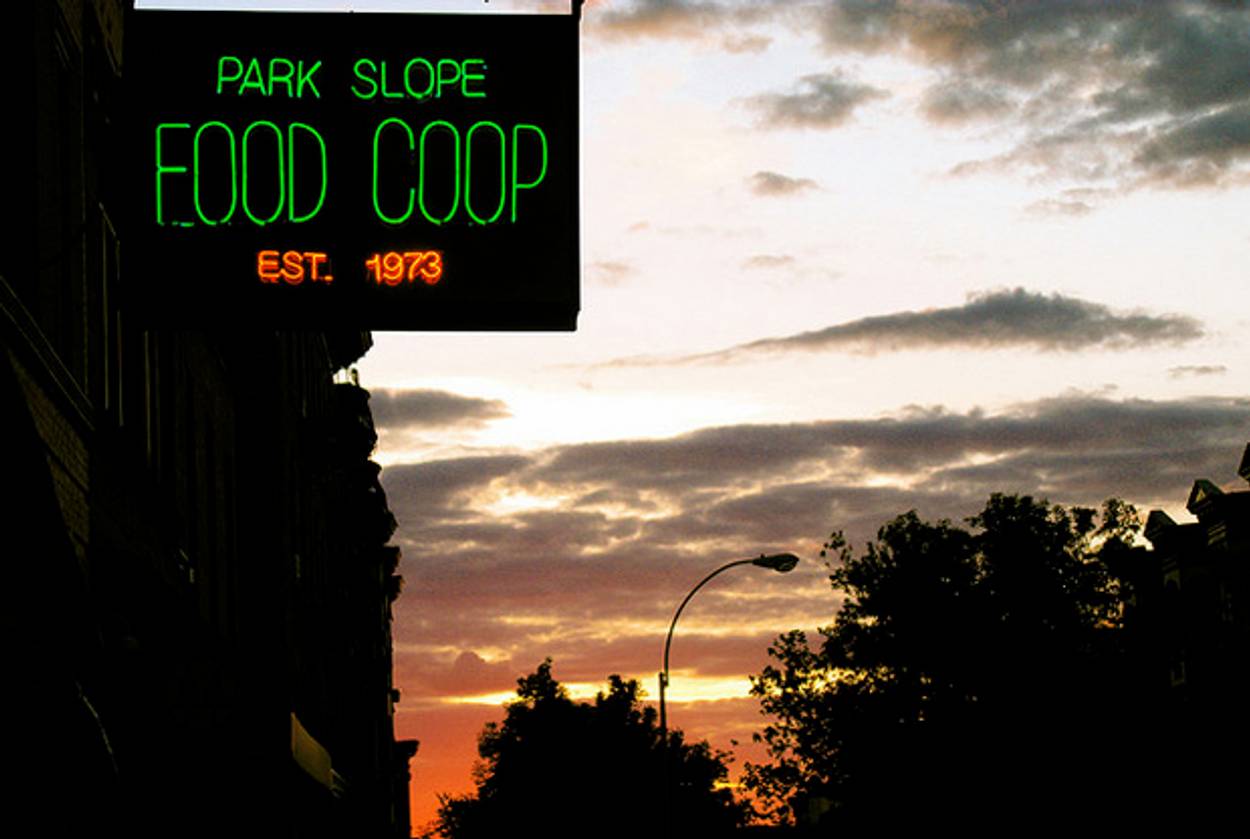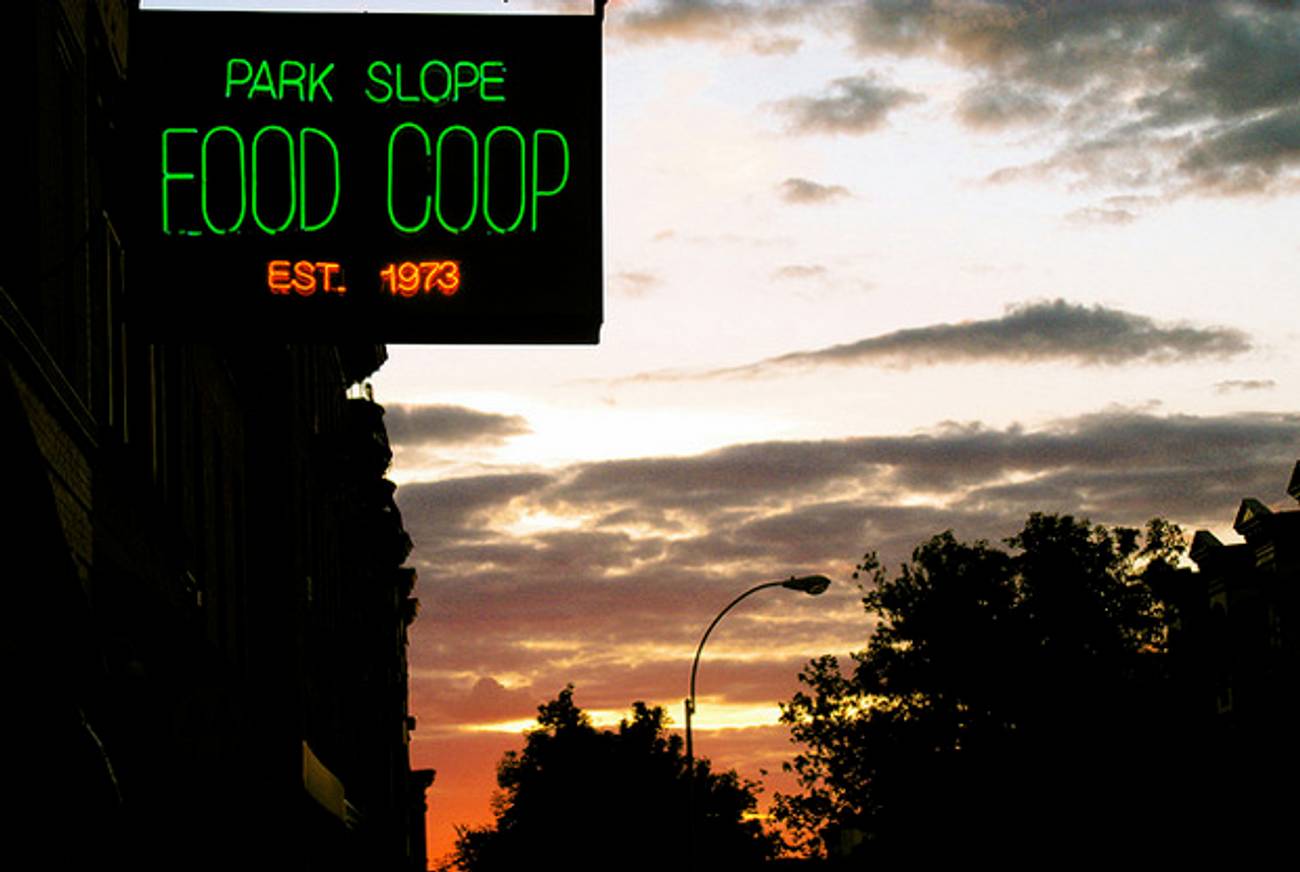Much Ado About … Well, Something
The BDS debate comes to Park Slope




There was only minimal, informal discussion at last night’s monthly Park Slope Food Coop members’ meeting of the issue that has put the 40-year-old institution in the news lately. (For a play-by-play of what was discussed, go here.) It will be at next month’s meeting, rather, on March 27—the last Tuesday of the month, like always—at which attendees will vote on whether to hold a Coop-wide referendum on whether they should continue to sell Israeli products.
So the next step is merely a vote on a vote—and, in fact, most observers predict that initial vote will reject the referendum. This would be far from the first time that the Coop, which does not sell Coca-Cola products or Domino sugar and doesn’t use plastic bags, decided to ban something. It’s not only that the Coop can be painted as an especially latte-liberal redoubt of a latte-liberal neighborhood; because its owners are also its customers, individual consumer choices are extrapolated into broad political statements, and vice versa. Anyway—as the Coop’s leadership noted, with evident weariness, in a recent statement: “The Coop carries very few items produced in Israel. Here is a current list: Sodastream seltzer maker and replacement cartridges, organic paprika, Israeli couscous, olive pesto or tapenade, vegan marshmallows, and organic sweet red peppers.”
But none of these quirks have prevented the Coop issue from becoming news, much as they won’t prevent you from arguing about it. These eccentricities make it a rather lousy symbol of the progress of the Boycott, Divestment, and Sanctions movement, but a symbol it has undoubtedly become.
“What is happening with the Food Coop where they are seriously considering a boycott of Israel?” said Glenn Beck recently. “When you use words like ‘I’m just anti-Israel’ or ‘I’m just anti-Zionist’—that’s anti-Semitic.” (“People want to get together to save money,” complained Barbara Mazor, who, like Beck, is against a boycott. “You have to be disdained for that? It’s minor compared to the bigger issue, but it’s just annoying.”)
“I’m not a Coop member, but as a progressive, a Jew, a member of the Park Slope community, I strongly oppose the boycott, I think it’s one-sided and unfair and I think it threatens to divide the Coop,” Councilmember Brad Lander told me. “I think one thing you will see over the next two weeks is the emergence of a progressive voice of opposition, not like Glenn Beck. There are many, many progressive Jewish Park Slopers who want to see Israelis and Palestinians living peacefully side by side and basically think a proposal like that would be a terrible idea.”
“We seek to avoid products that depend on the exploitation of others,” Carol Wald, a Jewish leader in the “PSFC members for BDS” movement, told me earlier this week, citing the Coop’s mission statement. “And to that end, we’ve supported a boycott against Coke and, back in the day, apartheid in South Africa.” She added, “We oppose discrimination in any form. I know a lot of folks deny it, but the facts on the ground show that there’s a lot of discrimination in the occupied territories.”
“BDS is bad because it’s not really a peace movement, it doesn’t do anything helpful for peace,” Mazor told me last Friday as she was preparing Shabbat dinner (tofu). She has spearheaded a group that has advocated vociferously against a boycott, dubbed More Hummus Please (the Jewish Community Relations Council of New York has lent its support). “The leadership of it, Omar Barghouti, says no normalization with Israel. Partnership between Jews and Arabs, they are against.”
Apropos the debate, Rabbi Andy Bachman of Park Slope’s Congregation Beth Elohim wrote, “Studying the BDS movement closely, it is clear to me that the goal is not to merely ‘end the occupation’ (a goal shared by many Israelis and American Jews) but the real goal is to end the existence of Israel as a Jewish and democratic state.”
Both sides have Websites (pro-boycott, anti-boycott), and each side will readily give you the other’s. Both sides have upcoming events if you’re interested in learning more: Michael Walzer and others will discuss opposing the boycott this Sunday; the pro-boycott movement screened a documentary last night.
Both read the same Bible and pray to the same God, and each invokes His aid against the other.
“The thing about the Coop is it’s a private organization, and at the end of the day, it’s about people who got together to save money on food, and it’s something we have to deal with internally,” said Mazor, who will have been a Coop member for 23 years this spring.
“I love everything it stands for, as well as the food,” concurred Wald, 17 years into her Coop tenure. “The food is a big deal.”
If Wald wants the Coop to take a stand, she wants the stand to be taken as democratically as possible. “What we’re doing right now is urging everyone, on whatever side of the issue, to attend that meeting, because at that meeting the membership will decide whether or not to open this proposal for the entire membership,” she said.
Mazor, by contrast, casts the debate in individual terms. “The Coop is about saving money on food, and people of all kinds of stripes have gotten together to do it. People didn’t come to have political decisions made for them. Thank you, I can read newspapers, and I think everyone in the Coop would like to make their own decisions.”
If the boycott is passed, Mazor estimated—and it sounded right to me—that as much as ten percent of the Coop’s 16,000 or so members would depart. The cascade of exits and the loss of each one’s $100 deposits could, Mazor suggested, threaten the liquidity of the Coop, which does an estimated $40 million in annual business.
Would Wald, who supports the boycott, leave the Coop if it continues to sell Israeli products? “I would never leave the Coop,” she answered. “I love the Coop so much that when I wanted to buy an apartment, one of my main requirements was that it be in walking distance.”
Food Co-op Readies for Boycott Vote [WSJ]
A Complete History of the Park Slope Food Coop’s Boycotts [Atlantic Cities]
Coop Statement on Proposed BDS Referendum [Park Slope Food Coop]
BDS Returns to Park Slope [Water Over Rocks]
Marc Tracy is a staff writer at The New Republic, and was previously a staff writer at Tablet. He tweets @marcatracy.